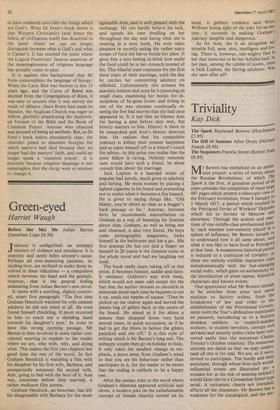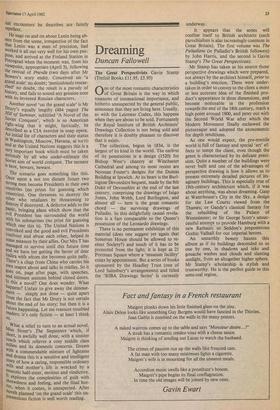Triviality
Kay Dick
Mr Bowers has embarked on an ambit- ious project: a series of novels about the Russian Revolutions, of which Th„e, Spark is the first. A gestation period of 4b years precedes the completion of these large 487 pages which present a telescopic view of the February revolution, from 9 JanuarY to 3 March 1917, a period which resulted in the Petrograd Soviet of Workers' Deputiejs which led to Soviets in Moscow and elsewhere. Through the actions and rear" tions of one middle-class professional fanw ly, each member conveniently placed in a sphere of influence, Mr Bowers intends us to understand how it all came about, and what it was like to have lived in Petrograd at that time. A momentous historical period is reduced to a confusion of triviality, as these not entirely credible characters cone melodramatically with the fast-changing social order, which gains no authenticity by the introduction of street names, historical characters and known events. One appreciates what Mr Bowers intends as he switches from army and naval mutinies to factory strikes, from the breakdown of law and order to the establishment of the Provisional Govern- ment (with the Tsar's abdication mentioned en passant), introducing us to a feckless drunken soldiery, to tumbril-minded workers, to student terrorists, corrupt civil servants and security police (who later con- verted easily into the notorious Cheka, Trotsky's October creation). The numerous sections are dated so that we may unders- tand all this is for real. We are, as it were, invited to participate. The family and their associates, through whose lives such world- influential events are illustrated are a wooden lot: at the risk of seeming unkind I would liken this to a Coronation Street type serial. A caricature, clearly not intended, affects all the characters. Mr Bowers has a weakness for the scatalogical, and the sex-
ual encounters he describes are faintly repellent.
He nags on and on about Lenin being ab- sent from the scene, irrespective of the fact that Lenin was a man of precision, had worked it all out very well for his own pur- Pose, and arrived at the Finland Station in Petrograd when the moment was, from his viewpoint, appropriate (April 3), following the revival of Pravda (two days after Mr I3owers's story ends). Conceived on 'a grand scale' no doubt; 'meticulously resear- ched' no doubt, the result is a parody of history, and fails to sound any genuine note with its invented Russian characters.
Another novel 'on the grand scale' is Mr Drilly's equally lengthy (484 pages) The 11 of Summer, subtitled 'A Novel of the Soviet Conquest', which is so American right-wing that it might, farcically, be described as a CIA exercise in soap opera. An initial list of characters and their status in Washington, Moscow, Havana, at NATO and at the United Nations suggests this is a very important book which must be taken seriously by all who under-estimate the Soviet aim of world conquest. The menace is here, beware, beware.
The scenario goes something like this. ante upon a not too distant future two strong men become Presidents in their own countries (no prizes for guessing which countries). One threatens to destroy the other who retaliates by threatening to destroy if destroyed. A defector adds to the Panic, bringing plans which show that the evil President has surrounded the world with his submarines (no prize for guessing which one this is). The United Nations is convoked and the good and evil Presidents confront and abuse each other, helped in some measure by their allies. Our Mrs T has Managed to survive until this future time and we have her getting the better of dear Indira with whom she becomes quite pally. There's a chap from China who carries his own teapot about and talks in riddles. So it goes on, page after page, with speeches, and intimate sessions behind closed doors. Is this a novel? One does wonder. What happens? Unfair to give away the denoue- ment — simply not done — quite apart from the fact that Mr Drury is not certain about the end of his story; but then it is a future happening. Let me reassure troubled readers: it's only fiction — at least I think so.
Miss a relief to turn to an actual novel,
miss Street's The Stepsisters which, if short, r , is awfully well done, with a sinister touch which relieves a cosy middle class milieu and its domestic concerns. Drawn with a commendable mixture of lightness and drama this is a sensitive and intelligent story of how a caring, responsible ordinary Wife and mother's life is wrecked by a neurotic half-sister, envious and vindictive. It explores the complexities of guilt with shrewdness and feeling, and the final hor- ror, when it comes, is unexpected. After novels planned 'on the grand scale' this un- Pretentious fiction is well worth reading.



































 Previous page
Previous page